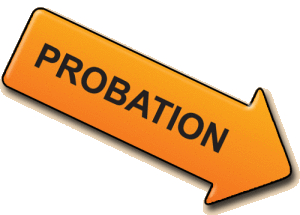Probation surrender hearings are proceedings that are initiated after someone violates a condition of probation. Once the probation officer learns of the violation he or she issues a notice of surrender. That document orders the defendant to come into court to defend the allegation that a violation occurred. Probation violations are very common. People who receive surrender notices call my office, often in a panic and ask what is going to happen at the probation surrender hearing. The answer to that is always case specific however some thoughts on the subject are laid out below.
Initially, you have to understand that people who get in criminal legal trouble are often sentenced to some sort of probation, even in instances where the underlying case disposition does not involve a conviction. When a case in continued without a finding there are often conditions of probation to be satisfied before the case is ultimately dismissed. This is also true when matters are resolved by pretrial probation in accordance with G.L. c. 275 Section 87. Most convictions naturally involve some sort of probation.
Notice of Surrender
The actual violation of probation can take on a number of characteristics, some of which are seemingly benign. Violations occur when someone does not report to his probation officer. Similarly, failure to abide by particular probationary conditions such as curfews staying away from certain locations can constitute probation violations. More significant violations such as a failure to take a drug test or complete a court ordered program is considered a probation violation. Getting arrested or charged with a new offense while on probation will be treated as a violation. If any of this occurs a surrender notice will issue and the process will start.
Preliminary Hearing
The next step in the process is the preliminary hearing. At that proceeding a judge will make an initial finding as to whether or not there is probable cause to believe that a probation violation has occurred. The standard is very low. Most likely, the judge will find probable cause simply because the probation officer states that you have done something violative of our probationary conditions. This does not mean that you have been found in violation. It only means that there will be a final surrender hearing ordered and scheduled. Additionally, bail might be set or additional conditions ordered after the preliminary hearing and before the final surrender hearing.
Final Surrender Hearing
At the final surrender hearing the judge must determines whether the probation officer is in fact right in alleging that you have violated your probation. Successfully defending these allegations depends on whether or not you can demonstrate that the probation officer is wrong. For instance, if one of the conditions of probation was to report in writing once a month and you have copies of the documents you provided demonstrating compliance you will win your hearing. Similarly, if the probation officer claims that you never completed a required program yet you have proof that you did complete the program you should win at this hearing. New arrests or allegations that you have committed a new crime are a little more difficult to defend. However, if your lawyer is able to convince a judge that you did not do what you are being accused of then a violation will not be found.
Probation Violation Sentences
Now lets say that you have been found in violation by a judge. The final step is sentencing. Judges usually have many options for sentencing on probation violations. They can continue the current probation regimen. They can modify or extend the probation. They can terminate the probation. Or, in some cases they can order you incarcerated for whatever amount of time the underlying statute permits.
The bottom line is this. If you are issues a probation surrender notice you better get a good lawyer. We have defended probation surrender matters for nearly thirty years. Call Attorney Stephen Neyman at 617-263-6800 now to discuss your case. Don’t wait. Start your defense now.
 Massachusetts Criminal Defense Attorney Blog
Massachusetts Criminal Defense Attorney Blog


